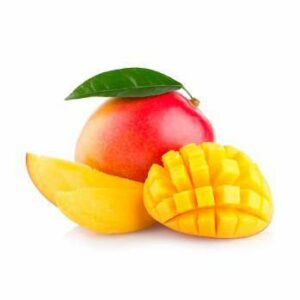 The colorful, sweet, nutritious mango originated from South Asia and is has been an important crop in India for thousands of years. Today, the mango is a mainstay of Indian cuisine and popular throughout the world. It is one of the most cultivated fruit in the Tropics. No matter which of the various types of mangos you choose, they are rich in Vitamins A, B, C, E, and K. They also contain amino acids, flavonoids, potassium, calcium, magnesium, niacin, and iron. They are high in fiber, low in sodium and calories.
The colorful, sweet, nutritious mango originated from South Asia and is has been an important crop in India for thousands of years. Today, the mango is a mainstay of Indian cuisine and popular throughout the world. It is one of the most cultivated fruit in the Tropics. No matter which of the various types of mangos you choose, they are rich in Vitamins A, B, C, E, and K. They also contain amino acids, flavonoids, potassium, calcium, magnesium, niacin, and iron. They are high in fiber, low in sodium and calories.
A good source of iron, mangos may be beneficial to those suffering from anemia. They are also rich in Vitamin C (67% DV per cup) which helps increase the efficiency of iron absorption. Mangos also contain Vitamin K (6% DV per cup) which helps our blood clot effectively and helps prevent anemia. Vitamin K is also important to the strengthening of our bones.
Mangos are rich in beta-carotene, one of the many antioxidants found in mangos. Antioxidants have been shown to fight free radicals which can cause cell damage and potentially lead to cancer. Studies suggest that phenols and enzymes found in mangos may prevent or stop breast, leukemia, colon, lung, and prostate cancer. Research has shown that quercetin, another antioxidant found in mangos, may lower the risk of cancer and heart disease.
Mangos also help support the cardiovascular system. Mangos are a good source of potassium and magnesium, two minerals connected to lower blood pressure and regular pulse. Mangos are also rich in dietary fibers, pectin, and Vitamin C, all of which lower the serum cholesterol levels, particularly the LDL cholesterol, also known as the “bad” cholesterol.
This delicious fruit also contains the antioxidant mangiferin which studies suggest may be able to reduce inflammation of the heart. Research has also shown mangiferin to offer protection against Parkinson’s disease.
Mangos are rich in Vitamin A (25% DV per cup) which helps prevent night blindness, dryness of eyes, softening of  the cornea, itching, and burning eyes. They also contain Vitamin E which improves and maintains eye health.
the cornea, itching, and burning eyes. They also contain Vitamin E which improves and maintains eye health.
Eating mangos can soothe the stomach by lowering acidity and improving digestion. Compounds found in mangos can help dissolve other foods in the stomach. High in fiber, mangos can be more effective at relieving constipation than equivalent fiber supplements.
Mangos have high levels of Vitamins A and C both of which are important to the production of collagen in our bodies. Collagen is known to provide firmness and elasticity to the skin, the body’s largest organ. Our skin’s make up is approximately 80% of collagen. Mangos can play an important role in supporting collagen synthesis and minimizing the appearance our skin’s aging process.
Eaten for its flavor or health benefits, mango is a great addition to our diet. It can be added to a smoothie, made into chutney or jam, grilled as part of a barbecue. It pairs well with fish and seafood, chicken, beef…
This Mango Avocado Salsa is sure to please and will be a great addition to your favorite meal. For best results, choose a mango that is firm, rather than soft and squishy. It takes only 5 minutes to prepare, so it can be prepared just before you are about to serve your meal.
 Mango Avocado Salsa
Mango Avocado Salsa
1 medium mango, peeled and diced (about 1 cup)
1 medium avocado, peeled, pitted and diced
¼ c. red onion, diced
1 Tbsp. lime juice
¼ c. cilantro, chopped
Combine mango, avocado, onion, lime juice and cilantro in a medium bowl. Salt to taste, toss and serve!
Serve immediately or store in a container with a tight lid. Make sure there is very little air space to prevent oxidation (the avocado turning brown).
NOTE: If you like a bit of heat, feel free to add a jalapeno or serrano pepper.

 Mango Avocado Salsa
Mango Avocado Salsa
Leave a Reply